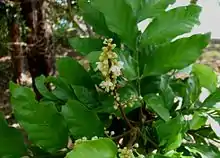Toechima daemelianum
Toechima daemelianum, commonly known as cape tamarind, is an evergreen tree from north-east Queensland in Australia.[2] It grows up to 13 metres high and a trunk which may be up to 20 cm wide.[3]
| Toechima daemelianum | |
|---|---|
 | |
| Scientific classification | |
| Kingdom: | Plantae |
| Clade: | Tracheophytes |
| Clade: | Angiosperms |
| Clade: | Eudicots |
| Clade: | Rosids |
| Order: | Sapindales |
| Family: | Sapindaceae |
| Genus: | Toechima |
| Species: | T. daemelianum |
| Binomial name | |
| Toechima daemelianum | |
| Synonyms | |
|
Cupania daemeliana F.Muell. | |
The species was formally described in 1875 by Victorian Government Botanist Ferdinand von Mueller in the ninth volume of his Fragmenta Phytographiae Australiae.[1] Mueller placed the species in the genus Cupania, naming it Cupania daemeliana, in honour of Edward Daemel who collected plant material from Cape York.[4] In 1879, Bavarian botanist Ludwig Radlkofer reassigned the species to the genus Toechima.
Toechima daemelianum is found in dry and riverine rainforest between Cape York and Tully.[3]
References
- "Toechima daemelianum (F.Muell.) Radlk.". Australian Plant Name Index (APNI), IBIS database. Centre for Plant Biodiversity Research, Australian Government.
- Hyland, B. P. M.; Whiffin, T.; Zich, F. A.; et al. (December 2010). "Factsheet – Toechima daemelianum". Australian Tropical Rainforest Plants (6.1, online version RFK 6.1 ed.). Cairns, Australia: Commonwealth Scientific and Industrial Research Organisation (CSIRO), through its Division of Plant Industry; the Centre for Australian National Biodiversity Research; the Australian Tropical Herbarium, James Cook University. Retrieved 26 August 2013.
- Reynolds, Sally T. (1985). "Notes on Sapindaceae in Australia, IV". Austrobaileya. 2 (2): 153–189. JSTOR 41738663.
- "Cupania daemeliana F.Muell.". Australian Plant Name Index (APNI), IBIS database. Centre for Plant Biodiversity Research, Australian Government.